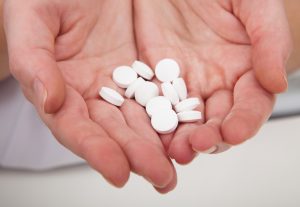
Ativan is a drug under the benzodiazepine class. It has the generic name lorazepam, and it is primarily used to treat anxiety disorders and seizures. It is also used to help relax your muscles.
Ativan and other similar drugs work by altering the concentration of gamma-aminobutyric acid (GABA), a molecule in the brain that inhibits nerve activity. As a result, the drugs reduce the level of excitation in the brain and spinal cord, effectively alleviating anxiety and seizure symptoms.
Ativan, like most benzodiazepines, has the potential to become physically addictive. As a result, if you try to stop using this drug, you may experience withdrawal symptoms.
Read on to find out what you can do to help relieve Ativan withdrawal symptoms.
What are the symptoms of Ativan withdrawal?
Withdrawal from this drug happens in two stages. The first is called the acute stage, which begins 1 to 4 days after your last dose of Ativan. Acute withdrawal symptoms include the following:
 Anxiety
Anxiety- Irritability
- Mood swings
- Panic attacks
- Increased blood pressure
- Increased heart rate
- Heart palpitations
- Insomnia
- Sweating
- Tremors
- Headache
- Difficulty concentrating
- Confusion
- Nausea
- Vomiting
- Abdominal cramps
- Seizures (in rare cases)
After acute withdrawal, the second stage is a more protracted withdrawal syndrome. This stage can last for 10 to 14 days. It can last longer, though, if you have taken very high doses of Ativan. The symptoms at this protracted stage of withdrawal are:
- Anxiety
- Drug cravings
- Nausea
- Vomiting
- Headache
- General feelings of discomfort
- Depression
The second stage may not even be the last. You may develop what is known as PAWS, or post-acute withdrawal syndrome. Here, you will experience depression, discomfort, mood swings, and other psychological symptoms that may persist for months to years after stopping your intake of Ativan.
If you were taking Ativan as prescribed medications for panic or anxiety disorders, the symptoms of these conditions may return after you stop taking the drug. These are called “rebound” symptoms, and they often happen during the acute withdrawal stage.
Quitting Ativan will be much more difficult once you have become physically dependent on it. The withdrawal symptoms may become so unbearable, compelling you to take the drug again just to get relief.
Are there ways to avoid Ativan withdrawal?
 The best way to avoid withdrawal symptoms is to never take Ativan in the first place. In cases when you absolutely must take it, you will most likely have a prescription. With that, make sure to strictly follow the dosage and frequency indicated in your prescription.
The best way to avoid withdrawal symptoms is to never take Ativan in the first place. In cases when you absolutely must take it, you will most likely have a prescription. With that, make sure to strictly follow the dosage and frequency indicated in your prescription.
If you notice that the drug’s effects are getting weaker, do not attempt to change your dose on your own. Talk to your doctor first. He may slightly increase your dose, give you a different medication, or stop it entirely, depending on how your body responds.
If you are already experiencing Ativan withdrawal symptoms, the best thing to do is seek professional assistance. That way, you can know what treatment routes will work best for you.
Medications and detox
As a first step in treatment, medically assisted detox is frequently performed. During detox, doctors will assist you in safely withdrawing from Ativan. They will slowly decrease the dosage until all the drug is completely eliminated from your body. You may also be given medications during the process to help alleviate some of the withdrawal symptoms.
Here are some medications that can ease the symptoms of Ativan withdrawal.
Diazepam, chlordiazepoxide, or clonazepam
These drugs belong to the same class as Ativan. They are all benzodiazepines. The main difference is how fast they take effect once taken. Ativan (lorazepam) is a short-acting benzodiazepine, while the other three are long-acting. These long-acting benzodiazepines work well to provide relief from the withdrawal symptoms of short-acting ones like Ativan.
Antidepressants
 Specific types of antidepressants called SSRIs (selective serotonin reuptake inhibitors) are useful in alleviating withdrawal anxiety and depression. Some SSRIs used in Ativan detox are fluoxetine and paroxetine.
Specific types of antidepressants called SSRIs (selective serotonin reuptake inhibitors) are useful in alleviating withdrawal anxiety and depression. Some SSRIs used in Ativan detox are fluoxetine and paroxetine.
Common over-the-counter medications
If you have mild withdrawal symptoms like headaches, diarrhea, stomach pain, and others, doctors may give you the usual medications used to relieve those symptoms. Examples include loperamide (for diarrhea), acetaminophen (for stomach pains), and ibuprofen (for headaches).
Melatonin
Melatonin is a naturally-occurring substance in your body that controls your sleep-wake cycles. Specifically, melatonin makes you feel drowsy every night. If you have insomnia, melatonin supplements may be given to help you sleep better.
What is “tapering off”?
Medical professionals do not recommend quitting Ativan “cold turkey”. Doing this could make withdrawal symptoms worse. Instead, the better thing to do is to “taper off”, which means to gradually reduce your dose over time. Tapering off helps make withdrawal more manageable and less uncomfortable.
Each person has a different response to Ativan, so it’s important to work with your doctor to determine the optimal tapering schedule for your case. It may take a week or longer, depending on the severity of your case. The more severe your case, the longer your tapering schedule will have to be.
Are there any other therapies that help?
Following detox, you may require additional behavioral treatments to address the mental aspects of Ativan dependence. Depending on the severity of your case, these therapies could take up to three months or longer.
Mild cases can be addressed through outpatient rehab. Here, you will go to a rehab facility only during scheduled therapies. After each day’s therapies are over, you can go back home.
If your case is more severe, you may need to go through inpatient rehab. You will reside in a rehab facility for one to three months and go through intensive treatments while there. Therapies, group sessions, and recreational activities will be scheduled every day. The purpose of inpatient rehab is to give you an environment where you can focus on recovery.
At the conclusion of treatment, you can expect to live a sober life once more. You will have better coping strategies that do not involve addictive substances.


